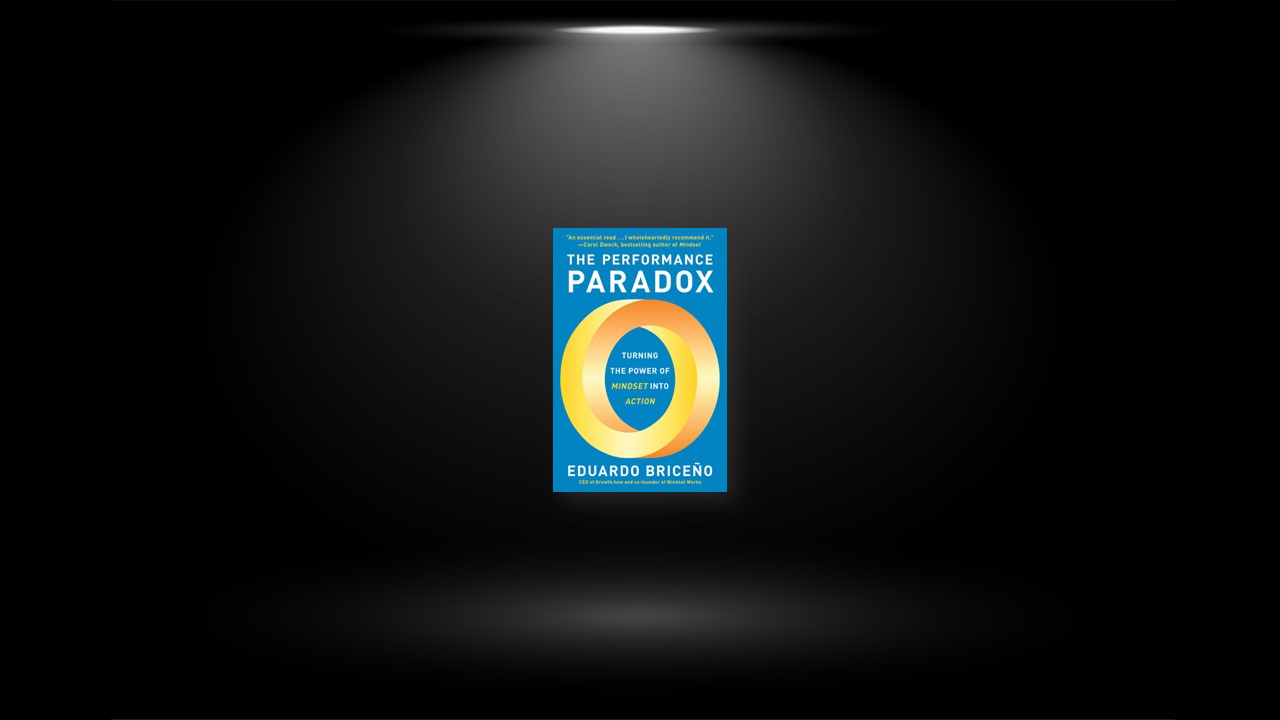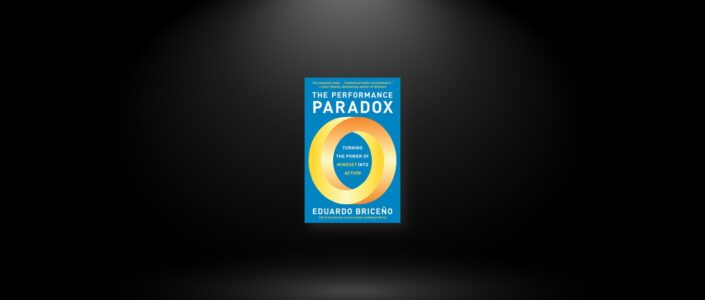The Performance Paradox
While it might seem counterintuitive, constantly performing does not improve our performance. The route to success is often not a straight line.
Most of us go about our days assuming that in order to succeed, we simply need to work hard to get things done. That’s what we’ve been told all our lives. So what’s the problem? Doesn’t hard work lead to better performance? The answer is a paradox—one the author calls the performance paradox.
The performance paradox is the counterintuitive phenomenon that if we want to improve our performance, we have to do something other than just perform. No matter how hard we work, if we only do things as best as we know how, trying to minimize mistakes, we get stuck at our current levels of understanding, skills, and capabilities.
Too often, the performance paradox tricks us into chronic performance, which leads to stagnation. We get stuck in a hamster wheel in our work, as well as in our relationships, health, hobbies, and any aspect of life. It can feel like we’re doing our best, when in fact we’re missing out on discovering better ways to create, connect, lead, and live.
Even if you’ve never gotten caught in a rip current in the ocean, you’ve surely been caught in the rip currents of life. They are invisible and ever present. We often find ourselves in situations where pushing forward with everything we’ve got does not have the desired effect. When refusing to learn to delegate means missing out on the opportunity to grow as a leader. When continuing to play a song the same way prevents us from learning to play it more beautifully. When we choose executing what we already know over exploring beyond our boundaries.
At the same time, we need to perform in order to get things done. To prosper in today’s complex and fast-changing world, we need to balance and integrate performance and learning. You might think that the way to get better at writing or cooking is to simply write more words each day or cook a three-course meal every night, yet that’s not the case. That’s the paradox.
If we focus only on performing the activity, our skills plateau and we risk becoming irrelevant, or worse. Tricked by the performance paradox, we too often stay on autopilot rather than take on challenges, solicit feedback, and examine surprises and missteps to learn from them. For an author, that could mean asking for critiques of draft text. For a cook, it might involve experimenting with ingredients from another country’s cuisine. For all of us, it means seeking out what we don’t know instead of focusing solely on what we do.
To thrive, we must reconnect with the curiosity and learning habits we all had as young children, before school taught us to focus on performance. This opens up boundless possibilities for what we can pursue and who we can become, preparing us to grow in our careers as our responsibilities evolve, the world changes, and new challenges and opportunities arise.
Learning While Doing (Integrating Learning & Performance Zones)
We don’t learn by doing, but we can learn while doing. Most of us will find our greatest opportunities not in dedicating blocks of time solely to the Learning Zone, but in changing the way we work so we regularly leap beyond the known while getting things done.
People often use the phrase learning by doing to convey their interest in becoming skilled at something by doing it. But that can easily be misinterpreted to mean that they simply do something and expect learning to follow.
Simply doing generates some improvement only while we are novices. Once we become proficient, it doesn’t work anymore. We need to add some Learning Zone to our Performance Zone. That’s why the author likes to call the integration of the two zones learning while doing rather than learning by doing—as a reminder not to just do.
John Dewey, Kurt Lewin, and David Kolb—education reformers who pioneered experiential learning and learning by doing—understood this. The theorists usually represented the process as a cycle. There are different versions of this cycle, but they all boil down to the same basic process: Try something new and experience the effects. Reflect on your observations. Develop a hypothesis based on those observations. Plan how to test that hypothesis. Repeat the cycle by trying something new again. This cycle is very different from merely doing because, as Dewey pointed out, “we do not learn from experience…we learn from reflecting on experience.”
Managers, take note. By empowering people to challenge the status quo by asking “What’s not working?” or “How could things work better?” and then running small-scale experiments, we not only improve the customer experience, we empower employees to bring their own creative thinking and curiosity to their work, which increases their commitment and sense of ownership.
Too many of us spend most of our time going through our to-dos with the sole goal of getting things done. But we have so much to gain by shifting our focus to getting things done in a way that will also lead to improvement. It’s about staying curious, asking questions, trying new things, soliciting feedback, and paying attention to new information.
Six Essential Learning Zone Strategies
STRATEGY #1: PRACTICE DELIBERATELY
To engage in deliberate practice: Break down abilities into component skills. Get clear about what subskill you’re working to improve at any given time. Give full concentration to a high level of challenge outside your comfort zone, just beyond what you can currently do. Use frequent feedback with repetition and adjustments.
Ideally, engage the guidance of a skilled coach—activities designed for improvement are often domain-specific, and great teachers and coaches know what those activities are and can give us expert feedback.
If a tennis player spends all her time on the tennis court playing doubles with friends—in the Performance Zone, in other words—she will plateau after a certain amount of time and never improve much beyond that point. But if she is engaged in deliberate practice, a coach might place her on the court and feed her volleys of increasing difficulty, helping her correct her mistakes. By the time she gets back to a match, the mistake in her form will have been corrected.
STRATEGY #2: LEARN BIG BY EXPERIMENTING SMALL
Experimenting at a smaller scale, with lower consequences of surprises and failures, and with ways to change and iterate quickly, tends to lead to greater learning faster. In other words, you’ll be better equipped to scale successfully sooner.
Chances are, you often do things you’ve done before, but in slightly different situations. Think through what tweaks may help in this new situation. You want to test something you think will likely enhance your performance, knowing that even if it doesn’t, what you learn will better equip you for the future.
Remember: Clarify what you seek to learn before you scale or commit. Set up a small experiment to learn quickly and leanly. As you learn and reduce uncertainty, move from exploration to application.
STRATEGY #3: WORK SMARTER, NOT HARDER
To work smarter over time, the author suggests: Make it a habit to consider what’s working, what’s not, and what to try differently. You can set a recurring calendar reminder to reflect on your own, or a section within a periodic meeting with your colleagues to reflect on this together.
Identify challenges and points of frustration, and ponder how they might be turned into opportunities for improvement. For example, the number of meetings and how they are run are frequent sources of frustration and an opportunity for restructuring.
Ask why you’re doing what you’re doing and how you might better achieve that higher-level goal. Perhaps there’s a better way to achieve your end goal that is completely different from what you’re currently doing.
Deepen your expertise. Learn from articles, books, podcasts, or courses to expand your awareness of effective practices, which might inspire shifts in your strategies. Learn from people around you. Share your ponderings and ask others for their thoughts or feedback. More brains are smarter than one.
STRATEGY #4: CREATE HABITS TO STRENGTHEN YOUR “AIR SENSE”
If a direct report comes to us with complaints about a colleague, it is a lot more effective if we know how to handle the situation in the moment rather than search online. If we have developed our air sense, we may quickly take into consideration everyone’s interpersonal skills, relationships, and the circumstances in order to decide how involved we should be. Our air sense informs what questions to ask and what guidance to give so if we decide to become involved in facilitating a conversation between the two colleagues, we’ll know when and how to intervene.
To develop your air sense, consider taking the following approaches: Target areas for improvement. Find and access high-quality sources of expertise. Consider how you respond to confusion or setbacks. Use the people around you as a brain trust.
You may find other methods that work better for you, such as journaling every day, or taking walks to reflect, or using a flashcard app. We can always get better at using more effective strategies, which makes the journey of life more interesting and enriching.
STRATEGY #5: DON’T BULLDOZE
Many people believe that the more you engage in deliberate practice, the better you become. But in their groundbreaking 1993 study, Ericsson and colleagues Ralf Krampe and Clemens Tesch-Römer found that world-class performers limit their engagement in deliberate practice because high-quality deliberate practice requires full concentration at a level that the brain can’t sustain all day.
In other words, rest is essential. The violinists included in the study rated sleep as being highly relevant for improvement of violin performance. These elite performers napped to recover from practice and slept an average of 8.6 hours per day, compared to the 7.8 hours per day reported by less-skilled students. This finding was consistent with other studies in which elite performers judged sleep as being extremely important and were found to sleep more than the general population.
For the great physicist Albert Einstein, music was a habit that not only offered him great joy, but also enhanced his work. There is considerable evidence that his genius was significantly enriched by his immersion in music. Einstein, an accomplished violinist, said if he had not been a scientist, he would have been a musician.
As reported by The Conversation, his second wife, Elsa, recalled a time when Einstein appeared to be “totally lost in thought.” He would wander back and forth from his study to the piano, play a few chords, then jot down notes. At the end of two weeks, he “surfaced with a working draft of the theory of general relativity.”
STRATEGY #6: ASK WHY
While how questions are critical, why questions can help us find completely different ways to achieve our higher-level objectives.
Why do I want to better describe the product features? Maybe it’s to get people excited about the product. Why do I want to do that? Maybe it’s to help them see it as a must-have. Why? So they can take action to get what they need. Okay, that’s a more important, higher-level goal, so how can I better do that? Maybe I’d start by asking them questions about the problems they’re facing rather than talking about product features.
Just as we can make the mistake of bulldozing by doing the same activity all day, we can make the mistake of staying too focused on improving lower-level goals. Asking why questions gets us unstuck. We want to be the most growth-minded and persistent when it comes to our highest-level goals, rather than doggedly pursuing things that may not be effective in the first place.


